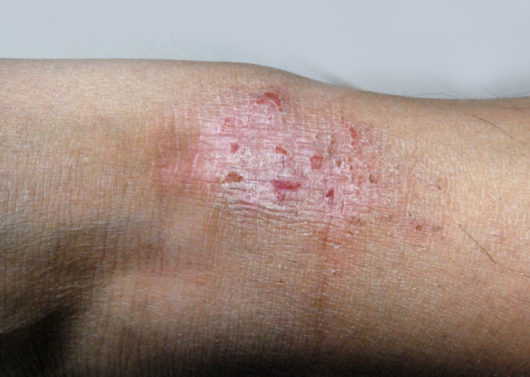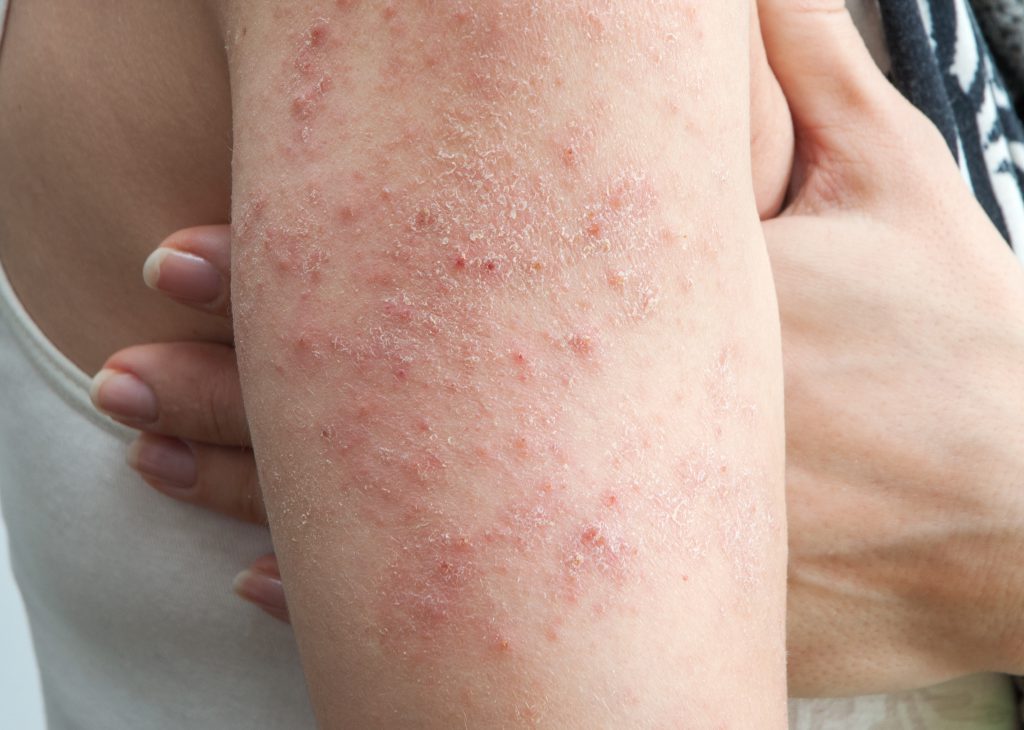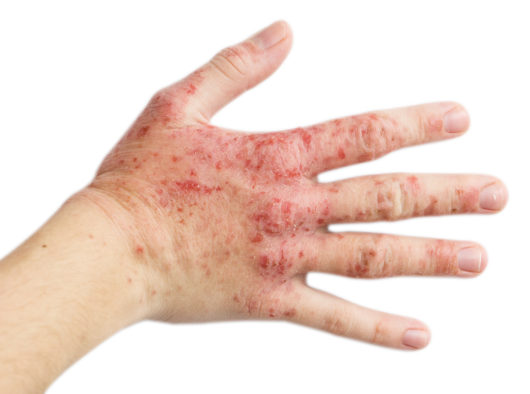If your skin seems to be angry with you — it’s itchy, it’s dry, it’s cracked — you’re not alone. You, along with as many as 30 million adults and children in the U.S., may be suffering from eczema.
Eczema is a chronic skin condition that presents as itchy, dry, cracking, scaly and/or rough skin, and in some cases may turn up as blisters that weep fluid. It’s a condition that many people feel embarrassed about having, so if you feel stressed and upset, you’re not alone.
So why are you getting eczema, and what can you do about it?
All About Eczema
The most common type of eczema is atopic dermatitis, though there are several other types of eczema as well: contact dermatitis, dyshidrotic eczema, hand dermatitis, neurodermatitis, nummular eczema, and stasis dermatitis. All will present as red, itchy skin, but some will also cause oozing and peeling. Many children and infants develop eczema, though it can disappear in adulthood or appear later in life.

Though eczema’s exact cause isn’t known, it’s generally accepted to be an overreaction by the body’s immune system. You may also be genetically predisposed to eczema, or be more prone if your family has a history of asthma or allergies. In many cases, a person’s genes make their body
to overreact to an irritating stimulus in their environment. This means that when the immune system sends out white blood cells to deal with a potential invader, it sends out too many.
The result is a scaly, itchy rash that can appear anywhere on the body. For some, the rash appears red and inflamed, for others their skin is rough and leathery. Eczema presents differently for everyone, but it’s almost always itchy. When the itch becomes too intense, many get caught in the “itch-scratch cycle”, which can lead people to scratch until they bleed.
Eczema is not contagious, though, so you can’t spread your eczema to anyone else. The only way to really confirm your rash is eczema is to visit a dermatologist.
Getting a Handle on your Eczema
Eczema is hard to cover up, so you may not be pleased to know that there is no cure for eczema. However, eczema is known to flare up in response to certain triggers. The most common are changes in climate and weather, generally dry skin, natural or manmade ingredients (anything from soaps and detergents to fruit and vegetable juices), stress, dietary choices (alcohol and dairy, in particular) or contact with itchy or irritating materials. It’s important to figure out what your triggers are so you can avoid them and therefore avoid future flare-ups.
Once you’ve got a flare up, there are some things you can do to treat the symptoms. Usually the complications from having eczema arise when people scratch their rashes. This, of course, is an incredibly hard instinct to control, because scratching an itch can feel great, and bring intense relief. Think about it this way: if you scratch your rash, you introduce more bacteria from your nails and fingers into the area, and it can become infected, making everything worse.
There are some general habits you can pick up that may help keep your eczema under control: establish a regular skincare routine (moisturizing every morning and evening, applying certain products), dressing in soft, breathable clothing (and avoiding itchy ones, like wool and polyester), staying mindful of scratching and itching, and being aware of stressful situations that may trigger flare-ups.
There’s a whole slew of over the counter eczema products on the market — everything from body cleansers and lotions to serums and balms. Look for labels that say “hypoallergenic” and “noncomedogenic” which means they won’t clog pores, or anything with a National Eczema Association Seal of Acceptance.

Bathing, in general, is important for eczema, because this helps give dry skin the moisture it needs. However, taking lukewarm (as opposed to hot) showers is actually better for those with eczema, and using the right cleansers (nothing with added fragrances, detergents or other irritants) is crucial to ensuring your shower or bath helps, not hurts, your eczema.
Another way to keep itching at bay and add moisture to your skin is to generously slather on a body lotion. Apply it immediately after you get out of the shower or bath, because your skin retains more moisture when it is wet and your pores are open. Avoid scented lotions, as the added fragrances can be irritants to your skin.
Other, more aggressive treatment methods are also available: prescription topicals, phototherapy, systemic prescription medications, and biologic drugs. Some turn to alternative therapies, such as natural supplements, meditation, and plant-based topicals.
A Cure on the Horizon?
You’ll notice that aside from avoiding stressful situations and other triggers, the above suggestions are treating the symptoms, not the true cause, of eczema. But recently, scientists have come closer to finding a cure for eczema after the discovery of the filaggrin protein.
Filaggrin may be responsible for shifting skin pathways and proteins that make people more likely to get eczema. Essentially, people who lack filaggrin may be more likely to get eczema.
Now that we understand one of the causes of eczema, scientists may be on the way to developing treatments for the disease’s causes. We’re not sure when the treatments will be developed, but it’s a pretty big step forward in treating eczema, and may mean that hope is on the horizon for the millions of people who battle this frustrating skin ailment.






OMG THANK YOU!
I have been with this since freshman year of college! I have a question can I use your skincare line even if I have eczema? I want to buy it but I am so scared that it will react badly with it >~<
Thank you!
Love from a pop-aolic
Loves this. I’ve had eczema since I was a baby and I am 27. It gets worse when it gets cooler (I live in SC) And it has a burning/chafy feeling that is very uncomfortable. I use gold bond for eczema otc and I have something that starts with a T white cream from my primary Dr that calms the redness. It’s tough to live with but I’ve managed! It’s on my arms, back of calves, and top inner thighs, and I can’t ever use fragranced lotions or body washes. That’s a BIG no no. 💜💙 eczema or not, I still love myself 😀
Thank you for addressing this topic! I have lived with eczema all my life and it is not fun at all. Eapecially the chronic part was hard on me, because I knew from a young age that it would never go away again. I hope this new study will help and I can’t wait to hear more about it!
Thank you so much for addressing this topic. I have had eczema my entire life and it is getting worst because of stress. I work I retail so I am in the attention of the public constantly and mang people do not understand eczema. It freaks them out and they won’t get near me. I’m just so glad that you have explained this briefly. Maybe it will help to get rid of some of the stigma which surrounds eczema.
Spot on, all of those point help manage my flare ups, hydrocortisone seems to help when it’s inflamed and regular lotion/petroleum jelly/bees wax help keep the moisture nicely
How do I control my granulomy annulare? Steroids help but I have problems taking them and the clobetasol propionate cream doesn’t work. I’m so tired of the constant itching. This has been going on for about 10 years.
I always had oily skin until my 50’s now it is so dry, flakey & the skin around my fingers crack & bleed. I have spots on my face that flake & are peely. No matter how much cream I use nothing helps. HELP ME PLEASE!!! 💕
I’ve suffered since a baby (now 32 years old) my hand eczema is getting out if control now winter is here. The joints of my fingers crack heavily and bleed. I’ve used most steroid creams and moisturizers but nothing seems to help.
I’ve suffered with eczema all my life, dry itchy inflamed skin that splits and swells. I’ve tried everything from over the counter 2 prescription medication nothing ever seems 2 work for very long. My eldest child luckily has no problems with there skin but my youngest it’s just the same as me and at the age of 2 still does not sleep through the night as it keeps him awake itching. Knowing there might be cure has me sitting here thinking please god let it it be true it’s so hard and interferes with day 2 day life. People just think it’s abit of dry skin but it’s so much more